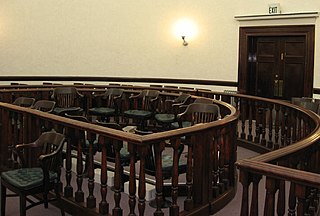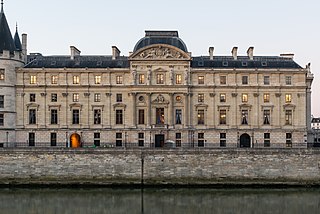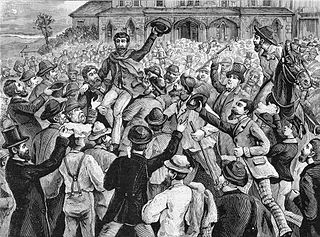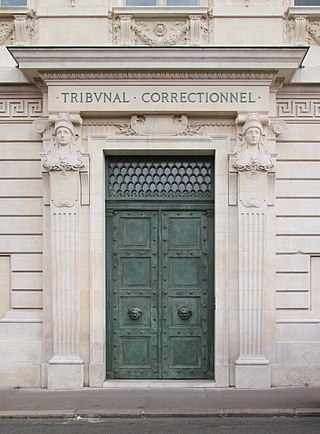Related Research Articles

A jury trial, or trial by jury, is a legal proceeding in which a jury makes a decision or findings of fact. It is distinguished from a bench trial, in which a judge or panel of judges makes all decisions.

A jury is a sworn body of people (jurors) convened to hear evidence, make findings of fact, and render an impartial verdict officially submitted to them by a court, or to set a penalty or judgment. Most trial juries are "petit juries", and usually consist of twelve people. A larger jury known as a grand jury has been used to investigate potential crimes and render indictments against suspects.
An inquisitorial system is a legal system in which the court, or a part of the court, is actively involved in investigating the facts of the case. This is distinct from an adversarial system, in which the role of the court is primarily that of an impartial referee between the prosecution and the defense.

The Court of Cassation is the supreme court for civil and criminal cases in France. It is one of the country's four superior courts, along with the Council of State, the Constitutional Council and the Jurisdictional Disputes Tribunal.

In common law jurisdictions, an acquittal means that the criminal prosecution has failed to prove that the accused is guilty beyond a reasonable doubt of the charge presented. It certifies that the accused is free from the charge of an offense, as far as criminal law is concerned. The finality of an acquittal is dependent on the jurisdiction. In some countries, such as the United States, an acquittal prohibits the retrial of the accused for the same offense, even if new evidence surfaces that further implicates the accused. The effect of an acquittal on criminal proceedings is the same whether it results from a jury verdict or results from the operation of some other rule that discharges the accused. In other countries, like Australia and the UK, the prosecuting authority may appeal an acquittal similar to how a defendant may appeal a conviction — but usually only if new and compelling evidence comes to light or the accused has interfered with or intimidated a juror or witness.
A hung jury, also called a deadlocked jury, is a judicial jury that cannot agree upon a verdict after extended deliberation and is unable to reach the required unanimity or supermajority. A hung jury may result in the case being tried again.
A bench trial is a trial by judge, as opposed to a jury. The term applies most appropriately to any administrative hearing in relation to a summary offense to distinguish the type of trial. Many legal systems use bench trials for most or all cases or for certain types of cases.

France's independent court system enjoys special statutory protection from the executive branch. Procedures for the appointment, promotion, and removal of judges vary depending on whether it is for the ordinary or the administrative stream. Judicial appointments in the judicial stream must be approved by a special panel, the High Council of the Judiciary. Once appointed, career judges serve for life and cannot be removed without specific disciplinary proceedings conducted before the council with due process.
A system for trial by jury was first introduced in 1923 under Prime Minister Katō Tomosaburō's administration. Although the system generated relatively high acquittal rates, it was rarely used, in part because it required defendants to give up their rights to appeal the factual determinations made. The system lapsed by the end of World War II. In 2009, as a part of a larger judicial reform project, laws came into force to introduce citizen participation in certain criminal trials by introducing lay judges. Lay judges comprise the majority of the judicial panel. They do not form a jury separate from the judges, as in a common law system, but participate in the trial as inquisitorial judges next to professional judges in accordance with the civil law legal tradition – similar to the French cour d'assises – who actively analyze and investigate evidence presented by the defense and prosecution.

The courts of appeal are the main appellate courts in the judicial system of Belgium, which hear appeals against judgements of the tribunals of first instance, the enterprise tribunals and the presidents of those tribunals in their judicial area. There are five courts of appeal for each of the five judicial areas, which are the largest geographical subdivisions of Belgium for judicial purposes. The division of the Belgian territory into the five judicial areas is laid down in article 156 of the Belgian Constitution. A judicial area covers multiple judicial arrondissements ("districts"), except for the judicial area of Mons. Each arrondissement has a tribunal of first instance. Further below, an overview is provided of the five courts of appeal and the judicial arrondissements their judicial area covers. The courts of appeal do not hear appeals against judgements of the labour tribunals; these are heard by the courts of labour.

The Corte d'Assise is an Italian court composed of two professional, stipendiary judges or giudici togati; and six lay judges or giudici popolari, who are selected from the people. The Corte d'Assise has jurisdiction to try all crimes carrying a maximum penalty of 24 years in prison or more. These are the most serious crimes, such as terrorism and murder. Slavery, killing a consenting human being, and helping a person to commit suicide are also serious crimes that are tried by this court. Penalties imposed by the court can include life sentences. The Corte d'Assise does not preside over cases involving attempted murder.

The court of assizes is the trial court which tries the most serious crimes in the judicial system of Belgium. It is the highest Belgian court with criminal jurisdiction; as such, it is the only Belgian court that can sentence someone to life imprisonment. The courts of assizes are not permanent courts; a new court of assizes is assembled for each new trial. There is a court of assizes in each of the ten provinces of Belgium, as well as one in the arrondissement of Brussels-Capital which is not part of any province. Further below, an overview is provided of the eleven courts of assizes and their seats. They are the only courts in Belgium for which the provinces are used as territorial subdivisions. They are also the only courts in Belgium that hold jury trials. The jury acts as sole trier of fact, but decides on the penalty together with the judges. The trial by jury of certain crimes is laid down in article 150 of the Belgian Constitution. The Belgian courts of assizes have the same origin as their French namesakes.

The Italian Code of Criminal Procedure contains the rules governing criminal procedure in every court in Italy. The Italian legal order adopted four codes since the Italian Unification. After the first two codes, in 1865 and 1913, the Fascist Government established in 1930 a new code adopting an inquisitorial system. In 1988 the Italian Republic adopted a new code, that could be considered to be somewhere in between the inquisitorial system and the adversarial system.
A citizen's right to a trial by jury is a central feature of the United States Constitution. It is considered a fundamental principle of the American legal system.

The judiciary of Belgium is similar to the French judiciary. Belgium evolved from a unitary to a federal state, but its judicial system has not been adapted to a federal system.

In France, a cour d’appel of the ordre judiciaire (judiciary) is a juridiction de droit commun du second degré, an appellate court of general jurisdiction. It reviews the judgments of a tribunal judiciaire. When one of the parties is not satisfied with the trial court’s judgment, the party can file an appeal. While decisions of a court of first instance are termed "jugements" in French, a court of appeals hands down an arrêt, which may either affirm or reverse the judgment of the court below. An arrêt (judgment) of the court of appeals may be further appealed en cassation. If the appeal is admissible at the cour de cassation, that court does not re-judge the facts of the matter a third time, but may investigate and verify whether the rules of law were properly applied by the lower courts.

In France, the correctional court is the court of first instance that has jurisdiction in criminal matters regarding offenses classified as délits committed by an adult. In 2013, French correctional courts rendered 576,859 judgments and pronounced 501,171 verdicts.
The French judiciary courts, also known as "ordinary courts", are one of two main divisions of the dual jurisdictional system in France, the other division being the administrative courts.

French criminal law is "the set of legal rules that govern the State's response to offenses and offenders". It is one of the branches of the juridical system of the French Republic. The field of criminal law is defined as a sector of French law, and is a combination of public and private law, insofar as it punishes private behavior on behalf of society as a whole. Its function is to define, categorize, prevent, and punish criminal offenses committed by a person, whether a natural person or a legal person. In this sense it is of a punitive nature, as opposed to civil law in France, which settles disputes between individuals, or administrative law which deals with issues between individuals and government.
The French code of criminal procedure is the codification of French criminal procedure, "the set of legal rules in France that govern the State's response to offenses and offenders". It guides the behavior of police, prosecutors, and judges in dealing with a possible crime. The current code was established in 1958 and replaced the code of 1808 created under Napoleon.
References
- ↑ Serge Guinchard, André Varinard and Thierry Debard, Institutions juridictionnelles (= Judicials institutions), Paris, Dalloz editor, 11th edition, 2011.
- ↑ Serge Guinchard and Jacques Buisson, Criminal procedural law, Paris, Lexisnexis editor, 7th edition, 2011.
- ↑ Direction de l'information légale et administrative. "Déroulement d'un procès devant la cour d'assises". Ministère de l'Intérieur.
